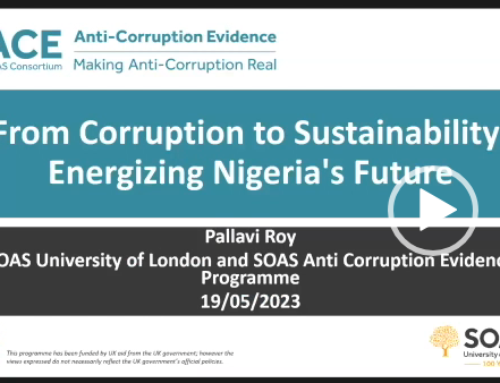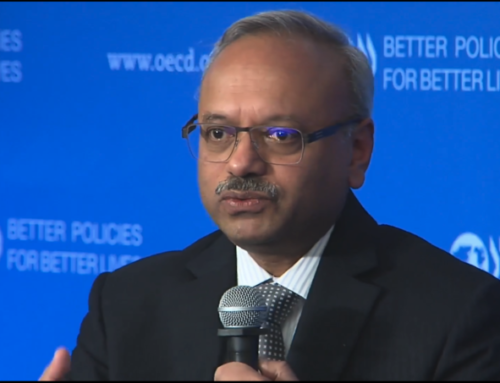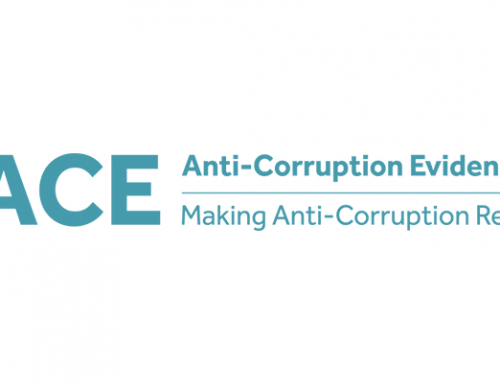
This blog was written by Dina Balabanova, Eleanor Hutchinson, Susannah Mayhew, Martin McKee, members of SOAS-ACE. It was originally published on the Health Systems Global website on 3 April 2020.
The world faces the greatest health crisis in over a century. COVID-19 is spreading rapidly, with cases and deaths soaring in many countries. It has overwhelmed some health systems and threatens many more. Unless it can be contained, and ultimately eliminated, many millions are likely to die.
The pandemic is now reaching Africa, where the problems will be magnified by a chronic lack of infrastructure, protective equipment and medicines, as well as measures to quarantine and track infected people. We have already seen what can happen: the health system in Sierra Leone, for example, could not adapt swiftly enough to mount an effective response to the 2014 Ebola epidemic.
Health workers are one essential part of the solution but are already in critically short supply in many parts of sub-Saharan Africa. The pandemic seems likely to push that supply even lower, while lockdowns will threaten millions of people with starvation and poverty, adding to the burdens on health workers.
Through close contact with infected patients, some will become ill and, tragically, some will die, as has happened in so many other countries. Many who have been exposed to the virus will self-isolate. Others will be at home, looking after children following school closures or caring for vulnerable relatives – tasks shouldered mostly by female health workers.
Another problem is rarely discussed: persistent absenteeism caused by long-term systemic issues, from inadequate training to poor working conditions. The SOAS Anti-Corruption Evidence (SOAS ACE programme) has explored absenteeism in Bangladesh, Nigeria and Tanzania to understand why it happens and identify solutions to support health workers and health systems. Our research on the interaction of formal and informal relationships, rooted in local political economies, offers lessons for an effective COVID-19 response.
What doesn’t work?
Most solutions to absenteeism focus on rules, and punishment for those who disobey them. These rarely work because they fail to understand why people are absent, or how easy it is to bend those rules.
Instead, health managers resort to informal approaches based on personal relationships to get things done. These are characterised by “new forms of leadership that embody respect and empower others, particularly front-line health staff, as well as social networks and relationships across, within and outside the health system”.
These approaches are vital when we are faced with the rapid spread of COVID-19. The response must be fast, but must also include all key local stakeholders. The Ebola response in Sierra Leone demonstrated the need to engage power structures, and village chiefs played a pivotal role in endorsing national messages. But the cooperation of other local players – such as elders, traditional leaders and locally respected women – was rarely sought, and this may have exacerbated local resistance to nationally-led responses.
New challenges demand new solutions
Five questions emerging from our research should be asked by policymakers trying to tackle absenteeism during this pandemic.
-
What does it mean to be a health worker in my country?
What are the experiences of health workers, who face different challenges in different settings? We found that health workers in rural and remote areas of Bangladesh face security issues and threats of violence, while those in Nigeria struggle to complete their hours or get to and from work because of poor transport infrastructure. In both countries, however, heavy workloads, poor working conditions and supply shortages undermine their ability to do their job. In effect, this represents ‘involuntary’ absenteeism – a form of ‘survival corruption’.We must also look beyond the workplace: something few health managers do. Female health workers, in particular, are expected to care for children and other relatives, which can interfere with their work. The political roles played by many health workers as part of local power networks are also overlooked, but may mean that workers are expected to prioritize services for some community members (e.g. in Bangladesh) or consult power brokers (‘godfathers’ in Nigeria). These informal structures create multiple lines of accountability outside the health system, but health managers have little guidance on how to engage with them.
An understanding of these structures may help to reduce absenteeism. Approaches could include negotiating with powerful individuals or groups about the services required and expected locally, which may be useful in the rapidly changing circumstances created by COVID-19. They may also involve joint agreement on strategies, accepted by all concerned, on the accountability of health workers during the crisis.
-
What do our health workers want?
One way to find out what health workers want is to ask them. We used a technique called ‘discrete choice experiment’, which invites them to make trade-offs after being provided with scenarios that reflect available policy options. The results from Bangladesh, Nigeria and Tanzania provide insights into how people are likely to respond to the pressures they face when deciding whether or not to be at work. In Tanzania, for example, health workers wanted to combine their public-sector work with private practice or a salary top-up, particularly to cover transport costs.Our experience tells us that health-care managers should avoid the simplistic solutions that dominate the literature on absenteeism and focus on the choices staff make. This means stepping outside the health system and engaging other sectors, including finance, social security and welfare ministries.
-
What needs to change?
We need a major cultural change to create a model that balances trust with accountability. Our research confirms the need to shift from strategies based on punishment to institutional approaches, with health managers able to adapt rules and procedures to fit local circumstances and incorporate local learning.This matters for the spread of with COVID-19, particularly at the early stage, where the epidemiology can differ between neighbouring areas and policies needs to adapt to changing circumstances. At present, however, such adaptation is difficult at the lower levels of health systems (even where district authorities are supportive) and particularly so in countries with rigid hierarchical bureaucracies.
Countries with decentralised administrative structures, such as Nigeria, where Local Government Authorities have considerable autonomy, may find this easier. However, this autonomy relates mainly to resource allocation and delivery, rather than the adaptation of regulatory, training and incentive structures. And it is not enough for one part of a country to do something – learning needs to be shared. In China, for example, pilot studies inform learning and are scaled up rapidly, with the national level providing a clearing house for successful initiatives that are then implemented at provincial level.
The COVID-19 pandemic requires major changes in fundamental features of the system: health worker training, deployment, management and incentives. Our early results suggest that up-skilling them for new roles, providing training, increasing their allowances/bonuses, and involving them in decision-making – which all enhance their career prospects – hold real promise. They should also be involved in decisions about resource allocation. Yet, as we saw with Ebola, health workers are often viewed as passive implementers, with few mechanisms in place to capture their experience.
-
How can we mobilize the non-health roles of health workers to respond to COVID-19?
Health workers provide a vital bridge between those most directly affected (individuals, communities and field responders) and the district and national authorities leading the response. Our previous work in Sierra Leoneshowed the importance of locally coherent responses organised around health workers who worked with communities, including village and paramount chiefs, and our current research reinforces the need to involve informal actors. Lessons need to be learned: insufficient engagement with these local stakeholders was identified as one reason for the failure of the early response to Ebola in Sierra Leone, yet the same mistake was repeated in the Democratic Republic of Congo.In practice, many coordination and communication tasks carried out by hard-pressed staff during such crises are additional and unpaid burdens that could increase absenteeism. Our findings suggest there is scope to explore these tasks, and draw on health workers’ links to local groups to see if they can mobilize powerful networks and opinion leaders to address the causes of absenteeism. At the same time, other stakeholders can help to slow the pace of the pandemic by drawing on their local knowledge and engaging with health workers to promote locally-relevant messages and counter misinformation.
-
How do we ensure fairness?
We need to understand power and political networks, and how the reality on the ground is shaped by vested interests. Health workers’ links to these networks can help to improve crucial health delivery during a pandemic. They can also encourage collective responses that promote equity by, for example, engaging in community initiatives led by women. This dual role promotes dialogue across different groups, and can help to balance the voices of those who hold power and those who lack it, to find solutions acceptable to all. Local responses to Ebola demonstrate that local elites can lead initiatives that benefit the weakest in society.Finally, there should be fairness in how health workers are treated, and what they are expected to do during any COVID-19 response. Frontline workers in rural and remote areas are often vulnerable in terms of a lack of protective equipment, long working hours, and limited transport. They may already work in areas that are insecure, and the stresses of an outbreak may leave them more exposed to violence. Supporting them to stay at work means meeting their needs and those of their families, as well as greater recognition of their vital contribution. They may, for example, need additional financial support.
The response to COVID-19 in low- and middle-income countries needs to support health workers and enable them to do their job. As the pandemic rages, this has become urgent. Our research shows that if we identify and mobilise existing informal structures and relationships at the frontline we can find feasible solutions that can respond to COVID-19, and build stronger health systems for the future.
—
This blog is an output of the SOAS Anti-Corruption Evidence (ACE) research consortium funded by UK aid from the UK Government. The views presented are those of the author(s) only and do not necessarily reflect the UK Government’s official policies or the views of SOAS-ACE or other consortium partner organisations.
—
Image credit: DFID/flickr, CC BY 2.0






